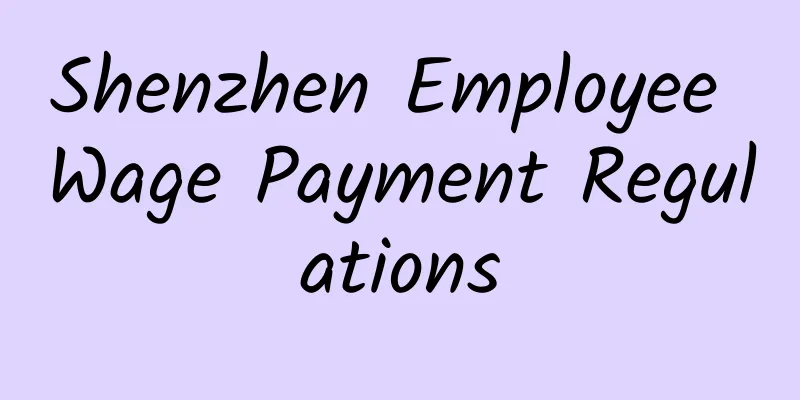Shenzhen Employee Wage Payment Regulations

|
(Adopted at the 33rd meeting of the Standing Committee of the Third Shenzhen Municipal People's Congress on August 27, 2004 Approved at the 13th Session of the Standing Committee of the 10th Guangdong Provincial People's Congress on September 24, 2004 Amended at the 28th meeting of the Standing Committee of the Fourth Shenzhen Municipal People's Congress on May 21, 2009 Approved at the 12th Session of the Standing Committee of the 11th Guangdong Provincial People's Congress on July 30, 2009) Chapter I General Provisions Article 1 These Regulations are formulated in accordance with the Labor Law of the People's Republic of China and other relevant laws and regulations and in light of the actual situation in Shenzhen City in order to safeguard the rights of employees to obtain labor remuneration and standardize wage payment practices. Article 2 This Regulation applies to enterprises, individual economic organizations, private non-enterprise units and other organizations (hereinafter collectively referred to as employers) within the administrative area of this city and employees who have formed labor relations with them. State organs, public institutions, social organizations and employees who establish labor relations with them shall comply with these Regulations, except for civil servants and personnel who are managed in accordance with the civil service system. Article 3 The term "wages" as used in these Regulations refers to the labor remuneration paid to employees in the form of money by the employer in accordance with relevant national regulations and the agreement between the two parties to the labor relationship. However, according to the provisions of laws, regulations and rules, the following expenses borne or paid by the employer to employees do not constitute wages: (1) Social insurance premiums; (2) labor protection expenses; (3) welfare expenses; (iv) One-time compensation paid by an employer to an employee when the labor relationship is terminated; (5) Family planning expenses; (6) Other expenses that are not wages. Article 4 The normal working hours wages referred to in these Regulations refer to the labor remuneration that employees deserve for providing normal labor to the employer during normal working hours. The normal working hours wages shall be legally agreed upon by the employer and the employee in the labor contract in accordance with the principles of fairness, reasonableness, honesty and trustworthiness. The agreed normal working hours wages shall not be lower than the minimum wage standard announced by the municipal government. Article 5 Employers shall pay employees’ wages on time and in full. Article 6 Wages shall be paid in cash and may not be paid in non-monetary forms such as in kind. Employers should pay wages to employees at least once a month. Article 7 The labor and social security administrative departments of municipal and district people's governments (hereinafter referred to as labor and social security departments) are responsible for supervising and inspecting the implementation of these Regulations. The public security, industry and commerce, construction and other relevant departments shall, within the scope of their respective duties, assist the labor and social security department in the supervision and management of wage payment by employers. Chapter II General Provisions on Wage Payment Article 8 An employer shall formulate a wage payment system in accordance with the law through collective consultation or other democratic means, and announce it to all employees of the unit. Article 9 The employer shall agree with the employee on wages and its payment cycle, payment date, etc. Article 10 Where an annual salary system is implemented or wages are paid according to an assessment period, part of the wages shall be prepaid every month at a rate not lower than the minimum wage. The overtime wage payment period shall not exceed one month. Article 11 If the wage payment cycle does not exceed one month, the agreed wage payment date shall not exceed the seventh day after the expiration of the payment cycle; if the wage payment cycle is more than one month but less than one year, the agreed wage payment date shall not exceed one month after the expiration of the payment cycle; if the wage payment cycle is one year or more, the agreed wage payment date shall not exceed six months after the expiration of the payment cycle. If the salary payment date falls on a statutory holiday or rest day, it should be paid on the previous working day. Article 12 If an employer is unable to pay wages on the agreed wage payment date for some reason, the payment may be extended by five days. If an extension of more than five days is required due to production and operation difficulties, the employer must obtain the written consent of the unit’s trade union or the employee himself, but the longest extension shall not exceed fifteen days. Article 13 If the labor relationship between an employer and an employee is terminated or canceled in accordance with the law, the employer shall pay the wages for which the payment period does not exceed one month in one lump sum within three working days from the date on which the labor relationship is terminated or canceled; wages for which the payment period exceeds one month may be paid on the agreed payment date. Article 14 Employee wages shall be calculated from the date on which the labor relationship between the employer and the employee is established until the date on which the labor relationship is terminated or cancelled. When the labor relationship is terminated or canceled, the wages for the employee's monthly bonus, quarterly bonus, year-end bonus, etc. that have not been fully paid will be calculated based on the employee's actual working hours. Article 15 An employer shall prepare a wage payment table when paying wages. The wage payment form should include records such as the name of the paying unit, wage calculation period, payment time, employee name, normal working hours, overtime hours, normal working hours wages, overtime wages and other payable items, as well as deducted items, amounts and wage account numbers. Wage payment statements should be kept for at least two years. When paying employees' wages, the employer shall provide the employees with a personal wage list, which shall be signed by the employees. The content of the wage list shall be consistent with the wage payment table. If the employees object to the wage list, the employer shall respond. Article 16 The employer shall pay wages to the employee himself. If an employer entrusts a bank to pay wages, the wages should be deposited into the employee's personal account. If the employer pays the employee's wages in cash, the employee must collect the wages in person and sign for them on the wage payment form. If the employee cannot collect the wages in person for some reason, he or she may entrust another person to collect the wages on his or her behalf, but a written authorization must be provided. If the employee dies, the wages shall be collected by his or her heirs or legatees. Article 17 If an employer pays employees' wages on a weekly, daily or hourly basis, their wages shall be calculated on the basis of eight working hours per day, forty working hours per week, and an average of twenty-one and seventy-five working days per month. Chapter III Overtime Pay Standards Article 18 Where an employer has any of the following circumstances, it shall pay overtime wages to employees in accordance with the following standards: (1) If an employee is arranged to work outside normal working hours, the employee shall be paid at a rate not less than 150% of the employee's normal working hours salary; (2) If an employee is arranged to work on a rest day and no compensatory leave is arranged, the employee shall be paid at a rate not less than 200% of the employee's normal working hours salary; (3) If an employee is arranged to work on a statutory holiday, he shall be paid a salary not less than 300% of his normal working hours salary. Article 19: For employees who implement the comprehensive working hours system, if the employer arranges employees to work after their actual working hours reach their normal working hours during the comprehensive working hours period, it shall be deemed as extending their working hours and the employer shall pay overtime wages to the employees at a rate not less than 150% of the employee's normal working hours salary. If an employer arranges employees who implement the comprehensive working hours system to work on statutory holidays, the employer shall pay overtime wages to the employees at a rate not less than 300% of the employees' normal working hours wages. Article 20 If an employer arranges employees who follow an irregular working schedule to work on statutory holidays, the employer shall pay the employees overtime wages at a rate not less than 300% of the employees' normal working hours wages. Chapter 4 Holiday Wage Payment Standards Article 21 If an employee takes leave during a statutory holiday, the employer shall pay wages. If employees who are paid on an hourly, daily or piece-rate basis take leave during statutory holidays, the employer shall pay their wages for the statutory holidays at a rate not lower than the employee's normal working hours wage. Article 22 If an employee enjoys annual leave, home visit leave, marriage leave, bereavement leave, maternity leave, nursing leave, birth control surgery leave and other holidays in accordance with the law, the employer shall regard them as providing normal labor and pay wages. Article 23 If an employee stops working for medical treatment due to illness or non-work-related injury during the medical treatment period prescribed by the State, the employer shall pay the employee sick leave wages at a rate not less than 60% of the employee's normal working time wages, but not less than 80% of the minimum wage. Article 24 The wages or work-related injury allowances of employees during the period of medical treatment for work-related injuries shall be implemented in accordance with the relevant provisions of work-related injury insurance. Article 25 If an employee takes a personal leave, the employer may not pay his or her salary during the personal leave. Article 26: For employees who implement the comprehensive working hours system, during the rest period after the actual working hours reach the normal working hours within the comprehensive working hours cycle, the employer shall regard it as providing normal labor and pay wages. Chapter V Wage Payment in Special Circumstances Article 27 If an employee has any of the following circumstances during normal working hours, the employer shall deem the employee to have provided normal labor and pay wages: (1) exercising the right to vote or to be elected in accordance with law; (2) Elected representatives or members shall attend meetings held by people's congresses at or above the district level and their standing committees, governments, political parties, trade unions, the Communist Youth League, women's federations and other organizations; (3) To participate in trial activities as a people's assessor or in litigation or arbitration activities as a witness; (4) Members of grassroots trade union committees who do not leave their jobs as stipulated in the Trade Union Law of the People's Republic of China participate in trade union activities; (V) Other circumstances prescribed by laws and regulations. Article 28 If an employer partially or completely stops production or business due to no fault of the employee, the employer shall pay the wages of the employees during the suspension period in accordance with the following normal working hours: (1) If the suspension is for less than one month, the employee shall be paid 80% of his normal working hours salary; (2) If the suspension of work exceeds one month, compensation shall be paid at a rate not less than 80% of the minimum wage. Article 29 If a work stoppage is caused by the employee's own fault, the employer may not pay the employee's wages during the period of work stoppage, except where it is determined to be a work-related injury. Article 30 If an employee is sentenced to probation, detention, suspended sentence of fixed-term imprisonment, parole, execution outside prison, or bail pending trial, and the labor relationship is not terminated, the employer shall pay wages according to the labor provided by the employee. Article 31 Where an employee is suspected of committing a crime and compulsory measures of personal freedom restriction are taken against him or her in accordance with the law or he or she is subject to administrative punishment of personal freedom restriction, the employer may not pay his or her wages for the period of time when his or her personal freedom is restricted. Article 32 When an employer goes bankrupt, dissolves or is revoked for liquidation according to law, the liquidation organization shall first pay the unpaid wages to employees in accordance with the order of repayment prescribed by relevant laws. Chapter VI Wage Deductions Article 33 Employers shall deduct or pay the following fees from employees’ wages in accordance with the law: 1. Individual income tax on employees’ wages (II) Social insurance premiums borne by employees (3) Assist in the execution of court judgments and rulings on the cost of support, maintenance and alimony borne by employees; (iv) Other expenses that the employer is required to deduct from the employee's salary or pay on his/her behalf as required by laws and regulations. Article 34 An employer may deduct the following expenses from an employee's salary: (I) Expenses for employees to compensate the employer for economic losses caused by their own faults (2) Economic penalties imposed on employees for violations of discipline by employers in accordance with the rules and regulations formulated in accordance with the law; |
<<: Zhejiang Province Enterprise Wage Payment Management Measures
>>: Shanghai Enterprise Wage Payment Method
Recommend
What does Macy's factory inspection include?
What does Macy's factory inspection include ?...
How is AVASK Accounting Firm? What services does AVASK Accounting Firm provide?
How about AVASK Accounting Firm? AVASK (UK) Accou...
Ann Taylor factory inspections usually do not match
Ann Taylor factory inspections usually do not mat...
ISO14000 series standard features
The ISO14000 series of standards have the followin...
SA8000 factory inspection factory dormitory hygiene environment and safety violations
SA8000 factory inspection factory dormitory hygie...
Purpose of social responsibility management system audit
When conducting a social responsibility managemen...
How to find an overseas influencer? What are the overseas influencer channels?
While everyone is amazed at the ability of Li Jia...
There are eight benefits to implementing ISO14000 environmental management system certification
Implementing ISO14000 environmental management sy...
How to use watcheditem to select products on Wish? How to use watcheditem to select products on eBay?
How to use watcheditem to select products in Wish...
What is the Organic Content Standard (OCS) certification?
OCS certification is one of the current organic c...
Anti-terrorism Ann Taylor factory audit documents
Anti-terrorism AnnTaylor factory audit documents ...
Experience of doing business on eBay, useful information coming!
Many eBay newbies are always at a loss when they ...
What is the Quanzhou Cross-border E-commerce Association? What are the requirements to join the Quanzhou Cross-border E-commerce Association?
What is Quanzhou Cross-border E-commerce Associat...
Camel Financial——Trade Fintech
How about CamelFinancial? Camel Financial focuses...
Things to note when doing Tesco factory audit
During the factory inspection, it is often not th...









